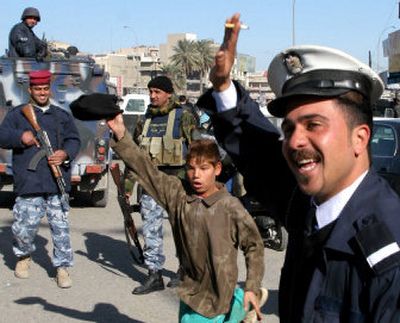Iraqis give mixed response to hanging

BAGHDAD, Iraq – As state-sponsored news channels saturated Iraqi airways with images of the noose going around Saddam Hussein’s neck early Saturday morning, residents here offered a surprisingly muted response.
The celebratory crowds were smaller than when the dictator surrendered to U.S. forces three years ago. And the expected promise of reprisal attacks did not come the way they did when the trial charging him with crimes against humanity began 14 months ago. Even in Saddam’s hometown of Tikrit, the rallying around the hometown hero was barren, especially compared to a month ago, when he was sentenced to death.
While many here said they were thrilled that Saddam had been punished, they also said they did not believe his death would lead to immediate change in their lives, saying that Saddam became largely irrelevant three years ago when American forces found him hiding in a bunker near his hometown.
“Executing Saddam will not change anything because we have many Saddam still,” said Mohammed Latif, a 35-year-old day worker from Baghdad, referring to Iraq’s current government.
Government leaders sought to tell a different story, saying Saddam’s trip to the gallows should become a turning point in Iraq’s strife. Referring to leaders of the Sunni insurgency, Prime Minister Nouri al-Maliki said in a statement, “Saddam’s execution puts an end to all their pathetic gambles on a return to dictatorship.”
Appearing calm and refusing the offer of a hood, Saddam was hanged shortly after sunrise Saturday in a Baghdad building notorious for executions that took place under his own orders.
Saddam was buried shortly before sunrise today in a family plot next to the graves of his two sons, witnesses said. Those who saw the ceremony said only a few people were present for the burial in Ouja, where Saddam was born.
Throughout the nation, larger crowds could be found in the more homogenous cities. In the Shiite holy city of Najaf, police and residents danced side by side, chanting and singing in the middle of the streets. In Tikrit, a mostly Sunni city, angry crowds blocked main roads.
But in communities immersed in civil strife, there was little response. In Baghdad, residents largely celebrated inside their homes or among friends at coffee shops. In the northeast city of Baqouba, one of Iraq’s most ethnically diverse, only police vehicles aimed at stopping retaliatory violence filled the streets.
Meanwhile, the violence in Iraq continued unabated, in a month that already had become the deadliest of 2006 for U.S. soldiers. American officials Saturday announced the deaths of three more soldiers, bringing December’s total to 109 and the war total to 2,998.
At least 72 people were killed and more than 100 people were wounded in two car bomb attacks, just hours after Saddam died. In the southern Shiite city of Kufa, a man detonated a bomb in a minibus, killing 34, police said. Eyewitnesses said nearby residents captured and attacked the man who set off the explosive.